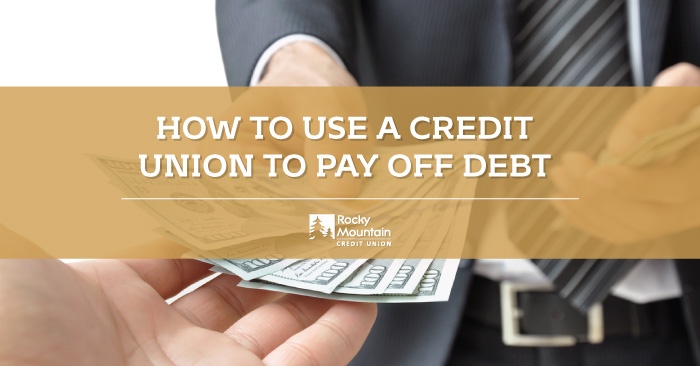The first thing we need to get out of the way is that credit unions are different from banks. When paying off debt, credit union staff members will help guide you and usually at no cost. Most credit unions have financial counselors for their members and even the lending staff can counsel you on how to get out of debt. Credit unions have a mission to educate the communities they serve so use the expertise of the staff at your credit union to help you pay off debt.
Here are some options to consider when you want to get out of debt:
Debt Consolidation
Consolidate all of the debt you want to pay off with one loan or line of credit from your credit unions. Credit unions still offer signature loans which can often help you consolidate several lines of credit into one loan with a fixed interest rate. This is especially helpful if you need some wiggle room in your monthly budget, as many people need. A lot of times, consolidating can create one payment that is less than all the other payments added together, which simplifies things considerably.
Create a Plan to Pay Off Debt
Visit with a financial counselor at your credit union. They can help you create a plan to pay off your debt and can help hold you accountable to that plan, which not only helps you with your financial situation but is a great help for those of you who sometimes have trouble staying on task with dealing with what they owe. When you have someone else in your corner rooting for you to pay off that debt it helps keep you on track - think of them like a cross between a personal trainer (someone who has the initiative to tell you when you are slacking off and in where) and a cheerleader (someone who is looking to give you a bit of the rah-rah). Most financial counselors with credit unions are free and happy to help with the skill and experience that they have accumulated over their years of work in the industry.
Credit Card Rates
Transfer those high-interest card balances to one card at your credit union, assuming that the rate is better. Look for transfer specials that will save you tons of money over the life of your balance in interest, as this ultimately has the most potential of giving you a big financial boost.. Also, consolidating those cards into one payment can help with your monthly budget and help keep all of your ducks in a little neat row.
Home Equity Line of Credit
Do you have equity in your home? If you do, this could be a great way to pay off high-interest debt and maybe even get a tax break. There are two products to consider here: the first is a Home Equity Loan, which is a fixed-rate loan that when it is paid off, is paid off for good - no surprise payments or "I thought I was done with this" situations. Then there is a Home Equity Line of Credit (HELOC). The HELOC is a fixed-rate or variable-rate product that is revolving. What this means is, when you pay down the balance, you have the funds available to you again, should you require access to them. This is especially enticing if you anticipate remodeling costs in the future, which depending on what you plan to remodel, can be highly costly and rather intimidating. Both of these products can consolidate your credit card debt into your home, ensuring that you may receive a tax rebate on the interest of your home. In the grand scheme of things, we have a win-win situation for everyone involved.
Student Loans
One thing that a lot of people do not realize is that credit unions can even be your saving grace with student loans. In 2010, credit unions started participating in the private student loan game and saved consumers lots of money. With the national student loan debt estimated at over one trillion dollars, even the smallest change can save consumers a ton of money. If you have student loans with high interest, consider consolidating those with a credit union - there is a lot to gain and not as much to lose.
There are so many resources out there to help you pay off your debt. Something to consider when you are looking for relief from debt is an organization that is not for profit and is owned by its members. Credit unions have many benefits, but one of the best is helping people get out of debt. Even if that means they lose a few dollars in the interest game, in the long run, this has a good chance to help you out from under the debt that's been weighing you down.

